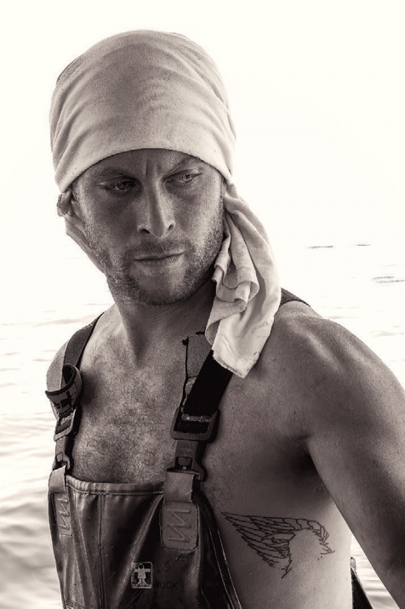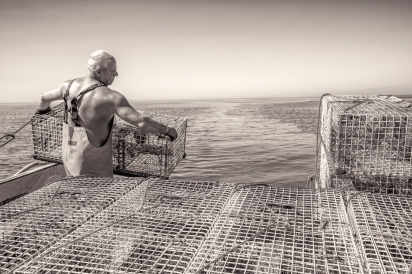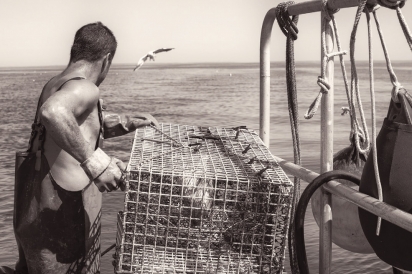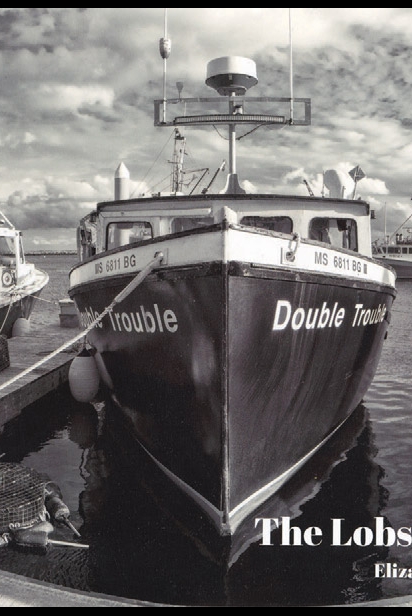Edible Reads: The Woman Behind The Lobstermen
Opening the photographic book, The Lobstermen, is like stepping off the dock and onto the fishing vessel Double Trouble. With each turn of the page the calm waves of Cape Cod Bay might just start your armchair gently swaying to and fro, and the soft creak of your wooden floors might begin to mimic the groans of a weather worn boat hull. What is almost certain is that you’ll hear the siren’s call of drawn butter and a side of corn on the cob. The Lobstermen is a 12- hour photographic journey, capturing the colorful life of Cape Cod lobstermen at sea. How far you allow yourself to be transported is up to you, but certain will be your newfound appreciation for the three men aboard Double Trouble, and the hard work they put in to get lobster to your local restaurants and markets. But as I studied the black and white pages of The Lobstermen, I wondered about the woman behind the camera. Why was this mission so important to her? What was it about men like Captain Chris Milewski and crew members Frank Travers and Timothy Lafortune, who all reside in Wellfleet, that captivated her? My own journey to find out would take me up and down the coastal waters of the northeast.
While the other kids were bouncing along the steaming Quogue, New York sidewalks on their pogo sticks, little Elizabeth Gabriel Brooke was lost at sea. But not lost in the “can’t find my way home” sense. No, quite the opposite. At just seven years old Elizabeth felt so at ease navigating the waters off her home in Eastern Long Island that she could be out on her 18-foot wooden Chris Craft, Caesar’s Ghost, by herself. It was there, bobbing in the shielded waters between Shinnecock Bay and Moriches Bay, that she would lose herself in the sparkle of the Atlantic waters. Someone not as familiar with boating and sea life might easily think that a seven-year-old out cruising unaccompanied sounds irresponsible at best, but Elizabeth was born on the water, so it’s easy to argue that she already had seven years of experience.
Elizabeth Brooke’s father undoubtedly lit the seaward spark that has filled Elizabeth’s sails for 70 years. Norman Brooke Dix, a boat captain and Coast Guard captain in World War II, developed and ran Moneybogue Boat Slip on Moneybogue Bay. He was also the one to buy his daughter Caesar’s Ghost with the blessing of her mother, Eleanor, who was not a natural sailor, “but got used to being around boats all the time,” Elizabeth jokes. After some time, when Caesar’s 28-horsepower Johnson engine didn’t have enough torque to keep up with Elizabeth’s adventures, she upgraded to a faster, fiberglass MFG vessel named Bluebird. But, as they say, with age comes responsibility, and eventually it was time for Elizabeth to trade in her nautical charts and compass for a spiral notebook and calculator, and headed off to Windham College in Putney, Vermont to study English and fine arts. From there she attended graduate school at the University of Massachusetts, majoring in photography and art education.
Provincetown became Elizabeth’s muse during graduate school, when she landed there during a work study program for UMass Amherst, teaching basic photography. In 1975 she decided to make Provincetown’s Macmillan Wharf her permanent home, living aboard a 38-foot Viking, and later a more spacious catamaran. In 1978 Elizabeth set her anchor on dry land and, along with her then-partner Laurel Brooke, her “mentor and second mother” Christina Davidson, and her husband Bill, purchased an abandoned 1800’s captain’s-home-turned-rooming-house located on Bradford Street, just a stone’s throw from the pier. Eventually the condemned “swiss cheese of a building,” as Elizabeth remembers, was given a new life as Gabriel’s Apartments and Guest Rooms. Now, 43 years and a couple of adjoining buildings later, the compound known as “Gabriel’s, A Provincetown Hotel” is one of the highest-rated and most celebrated inns on Cape Cod. It is still owned and operated by Elizabeth, along with her wife of 16 years, Elizabeth Anne Brooke, and their son, Christopher. Eventually, as so often happens with running an inn, the business takes over, and things like cameras get pushed further into the closet. A few years ago, thanks to the hard work and support only a wife and son could offer, Elizabeth was given the gift to retire from the day-to-day running of Gabriel’s to get back behind the lens once again, this time as a generalist photographer. “When I picked up the camera again, I began taking photographs of whatever moved me, “ Elizabeth explains, “A ship in the distance, a moonscape, a Great Blue Heron soaring over the marsh, or a spooked fox running across the pier.”
Elizabeth’s love of nature extends beyond the lens of a camera. In 2016, she found out the Humane Society was going to sell land that housed the Cape Wildlife Center in Barnstable to a building developer, she became the founder and director of the Friends of Cape Wildlife (FCW). The organization saved the center by raising public awareness, which quickly became a public outcry. Soon after, the center transferred ownership to the Pegasus Foundation and was renamed the Birdsey Cape Wildlife Center (named for Barbara Birdsey, the founder of Pegasus). Pegasus, in turn, transferred its five acres to the protective umbrella of the New England Wildlife Center. The center’s mission continues to provide care, advocacy and rehabilitation to local birds, mammals and reptiles that are in distress, in the hope that they can be returned to their native habitat (the FCW still maintains an animal help hotline). When it came to Elizabeth’s attention that there were no serious animal activists specific to the Provincetown area, she founded and became an active member of Provincetown’s own Animal Welfare Committee. The goals of the team are to conduct research and report on findings related to animal issues, including local, regional and federal animal control legislation, licensing, public education and overall awareness. Elizabeth puts her mission statement in simpler terms, “I wanted to create a voice for those who could not speak for themselves.”
After closing the back cover of The Lobstermen, I have been temporarily absorbed into Elizabeth’s love of the open water, of life upon the sea, of the people all around her, and the nature that surrounds her. For the book The Lobstermen, Elizabeth lets her camera do all the talking. There are no explanations, and no dialogue between the subjects, and I’m pretty sure that was the grand plan. You just take the ride through Cape Cod Bay and let her photographs tell the story. In the introduction, she compares the characteristics of the captain and crew to the boat on which she spent one sunny Cape Cod day. She writes, “Double Trouble is a powerful work platform, extremely seaworthy and can carry a lot of weight.” Getting to know Elizabeth Brooke, it is easy to understand what put her on that lobster boat on a beautiful, Cape Cod summer day, and just as easy to make the same comparison about her art.
Find more of Elizabeth G. Brooke’s photography at elizabethgbrooke.com
The Lobstermen can be purchased at blurb.com/b/10527651-the-lobstermen








